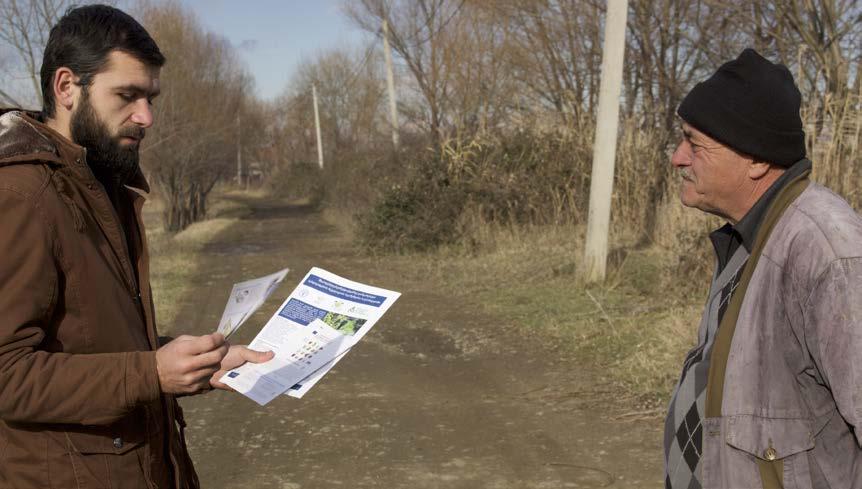
2 minute read
Case study 3 Georgia
Country: Georgia Partner organisation: EcoLife Year conducted: 2016 Number of participants: 920 (448 men, 472 women) Location: Kvemo Kartli
Description of participants:
Participants were adult farmers and farm workers from the target area. Respondents were selected to give a reasonable representation of men, women, farmers, farm workers and people for whom Georgian is not their first language so that adequate comparisons could be made between the different groups in terms of risk of pesticide exposure and poisoning.
Protective equipment:
Just 2 respondents (0.2%) reported wearing protective coveralls when using pesticides. The vast majority simply reported wearing ordinary non-protective clothes. In addition, 37% farm workers reported wearing boots and 27% gloves. However, it was difficult to determine how protective these items were. They were often sourced at builders’ merchants and not necessarily designed to protect from chemicals. Just 3% farmers and 4% farm workers reported having had any training in the last decade on the use of protective equipment when handling pesticides. This may be an important factor in the extremely low use of PPE. In addition, summer temperatures are high in Georgia, making wearing masks and overalls hot and uncomfortable.
Photo: A picture of face masks on sale in Georgia in 2016 where protective equipment was rarely found on sale with pesticides and, when it was, it was usually not of a type that would provide suitable protection. Credit: PAN UK
% pesticide users reporting APP in previous 12 months: 20% of people who handle pesticides in the survey said they suffered from signs and symptoms of APP in the previous 12 months. Number of incidents in previous 12 months: There was a gender difference here. None of the participating women reported more than one incidence of APP over the previous 12 months. However, 6% (46/920) of men using pesticides suffered multiple incidents over a 12-month period. % seeking medical attention: 12% of people who reported APP said they sought medical attention.
Post-registration monitoring (information from consultations with national authorities)
Georgia lacks a reporting mechanism for pesticide poisoning incidents.
Products linked to APP
The participants in the survey were asked which pesticide they had been using when they experienced unusual signs and symptoms. Unfortunately, because of the very common practice of repacking pesticides into unlabelled containers, and other issues with linking the product to the incident, only a small proportion of the incidents of APP could be linked to specific products. In these instances, the most cited pesticides were lambda cyhalothrin, metribuzin and dimethoate.
Conclusion Georgia study
This was an unusually large-scale study that revealed poor conditions 40 of use of pesticides. The use of PPE was very low and repacking of pesticides into unlabelled bags and bottles was common, meaning that essential safety and use information was often absent and the risk of accidental exposure increased. The study was conducted in close collaboration with Georgian national authorities. Following the study, national authorities conducted measures to tackle the practice of pesticides retailers repacking pesticides into unsuitable containers. They also used the survey data to submit two reports to the Rotterdam Convention under Article 6 on Severely Hazardous Pesticide Formulations, one concerning dimethoate and the other concerning lambda cyhalothrin.

Photo: Surveying farmers in Georgia Credit PAN UK









